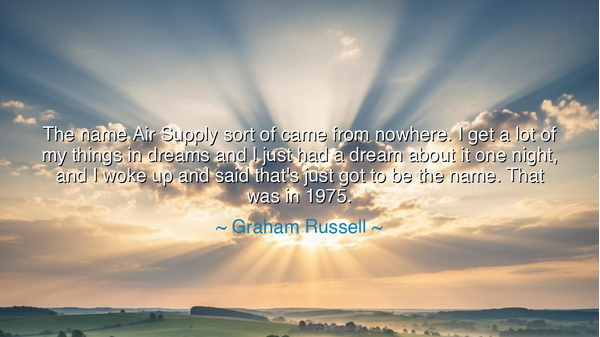
The name Air Supply sort of came from nowhere. I get a lot of my
The name Air Supply sort of came from nowhere. I get a lot of my things in dreams and I just had a dream about it one night, and I woke up and said that's just got to be the name. That was in 1975.






Hearken, children of music and mystery, and attend to the words of Graham Russell, who spoke of a moment both ordinary and divine: “The name Air Supply sort of came from nowhere. I get a lot of my things in dreams and I just had a dream about it one night, and I woke up and said that’s just got to be the name. That was in 1975.” In this gentle confession lies a truth as ancient as creation itself — that inspiration, when pure, does not always come through effort or logic, but through dreams, through the whisperings of the unseen, through the realm where the soul communes with mystery.
Since the earliest ages, humankind has regarded dreams as sacred messengers. The poets of Greece, the prophets of Israel, the sages of India — all knew that visions in sleep were not mere fancies, but windows into truth. Russell’s dream, though born in the modern world, belongs to that timeless tradition. The name Air Supply came not from the mind’s reasoning, but from the spirit’s intuition — a phrase both ethereal and grounding, evoking breath, life, and the unseen forces that sustain both body and song.
When he says that the name “came from nowhere,” he speaks not of emptiness, but of the boundless source from which all art arises. Every artist knows this moment: when a melody appears unbidden, when a word, a color, or a vision springs forth without planning. The ancients called this the touch of the Muse, the voice of inspiration itself. And so, from the dream of one man came a name that would carry the music of compassion and love to millions, reminding the world that art is not only created — it is received.
Consider the story of Paul McCartney, who awoke one morning with a melody in his mind so clear and perfect that he feared he had heard it before. He played it again and again, seeking its origin, until he realized it had come entirely from within — or perhaps from beyond. That melody became Yesterday, one of the most beloved songs ever written. McCartney, like Russell, was a dreamer chosen for a message. The ancients would have said the gods had breathed music into his soul.
Air Supply’s name, born of such a dream, carries a symbolism as powerful as its sound. Air — invisible, vital, omnipresent — represents spirit, inspiration, and life itself. Supply — the act of giving, of sustaining — completes the phrase with generosity and motion. Together, they express the purpose of music itself: to breathe life into the world, to offer emotional nourishment, to connect hearts through sound as air connects all living beings. The dream, then, was not random — it was revelation.
But Russell’s story holds a deeper lesson beyond music. It teaches that one must learn to trust the unseen, to honor intuition, to listen to the quiet voice that speaks when reason sleeps. Dreams are not distractions but messages; they are reminders that creativity, faith, and destiny often speak in symbols and whispers, not in plans or charts. To dismiss such visions is to close the door to the divine within us.
Practical wisdom flows from this truth. Attend to your dreams, for they are teachers. Keep a journal by your bedside, record what visits you in the night, and see how the threads of imagination weave through your waking life. The world may teach you to value logic and precision, but inspiration moves by mystery, and those who heed its call become creators, innovators, and guides.
Finally, remember the spirit of Graham Russell’s dream — that great beginnings can come from silence, that a name or an idea born of sleep can transform into a lifelong legacy. Trust the voice that speaks softly in the dark, for it may carry within it the breath of destiny. Just as Air Supply’s music continues to fill the air with harmony and warmth, so too may your dreams fill the world with meaning — if only you dare to listen.






AAdministratorAdministrator
Welcome, honored guests. Please leave a comment, we will respond soon